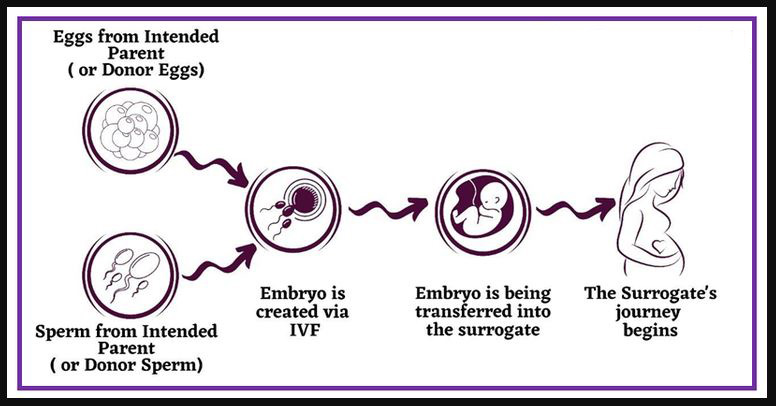As a person thinks of third-party reproduction, he or she often gets confused between IVF and Surrogacy. That said, In vitro fertilization (IVF) and surrogacy are two separate, but often interconnected, procedures within the sphere of assisted reproductive technology (ART). Moreover, understanding the connection between the two requires knowledge of what each entails.
In the following parts of the blog, we will look through the core difference and connections between these two elements of ART. Besides, we will further talk about the key aspects like the cost of surrogacy and IVF in Colombia.
The key difference between IVF and Surrogacy!
IVF treatment in Colombia is a medical procedure where an egg is fertilized by sperm outside of the body, in a specialized laboratory. Besides, the resulting embryo is then transferred into the woman’s uterus for pregnancy. That said, IVF is an option for those struggling with infertility, or certain genetic disorders, or for same-sex couples and single individuals who wish to have biological children. Also, the process of IVF involves five key steps: stimulation of the ovaries to produce multiple eggs, egg retrieval, and fertilization in the laboratory, embryo culture, and finally, embryo transfer.
Surrogacy in Colombia, on the other hand, involves a surrogate mother who agrees to bear a child for someone else, known as the intended parent(s). That said, surrogacy can be of two types – traditional and gestational surrogacy in Colombia. In traditional surrogacy, the surrogate is biologically related to the child, as her own egg is used for conception, usually through artificial insemination. In contrast, gestational surrogacy in Colombia involves the use of an embryo created through IVF, with no biological connection between the surrogate and the child. Besides, the intended parents provide the egg and sperm or use donor gametes, and the resultant embryo is transferred into the surrogate’s uterus.

The relationship between IVF treatment in Colombia and surrogacy is, therefore, most apparent in gestational surrogacy. That said, IVF plays a critical role in facilitating pregnancy by creating the embryo that will be implanted in the surrogate. Moreover, the surrogate then carries the pregnancy to term on behalf of the intended parents. Therefore, IVF is an integral part of the surrogacy process in such cases, enabling those who cannot carry a pregnancy for various medical reasons, same-sex male couples, and single men to have a child biologically related to at least one parent.
IVF and Surrogacy do share a common ground!
However, it’s important to note that while IVF is often used in conjunction with surrogacy, not every IVF treatment in Colombia involves a surrogate. Also, many couples undergo IVF to conceive and carry their own child. In these instances, the embryo created via IVF is transferred to the intended mother’s womb.
On the other hand, surrogacy and IVF share common ground not only in the practical steps involved but also in the emotional and ethical challenges faced by those involved. That said, both options require careful consideration and emotional preparedness. Also, issues around the potential commercialization of surrogacy, legal parentage, and ethical implications of these technologies are shared concerns in the landscape of ART.
In conclusion, the intersection of IVF and surrogacy in Colombia lies within their shared goal: to assist individuals and couples in their journey to parenthood. Although they can exist independently, they often intertwine, especially in gestational surrogacy, to offer a path to parenthood for those who might otherwise be unable to have a biological child. Moreover, by creating a conduit between the creation and the nurturing of life, IVF and surrogacy jointly represent a major advancement in reproductive medicine.
What makes surrogacy a cost-effective process?
While surrogacy is typically a costly endeavour, there are perspectives from which it can be considered cost-effective. That said, here are a few ways in which surrogacy might be seen as a financially sound choice:
Success Rates: Surrogacy, particularly gestational surrogacy in Colombia, often has higher success rates than other fertility treatments, especially for individuals or couples who have struggled with recurrent pregnancy loss or multiple failed IVF attempts. In these cases, investing in surrogacy may increase the chances of having a child, making it a more cost-effective choice in the long run.
Health Considerations: Surrogacy in Colombia can be a safer option for individuals or couples where pregnancy presents significant health risks, or for those who have medical conditions that make pregnancy unsafe or impossible. Besides, avoiding potential medical complications, or even life-threatening conditions, makes surrogacy cost-effective from a health and well-being perspective.
Avoiding Multiple Treatment Costs: Infertility treatments like IVF may come as expensive. Moreover, several cycles are required before a successful pregnancy. In some cases, surrogacy might achieve pregnancy sooner, potentially saving money over multiple fertility treatment cycles.

Legal Certainty: In many places, laws around surrogacy are more defined than those around adoption, particularly international adoption. This can provide a smoother process, avoiding potential costly legal complications.
Psychological Benefit: For those who deeply desire a biological connection to their child, surrogacy can make this possible. That said, this emotional benefit, while not easily quantifiable, can make the cost of surrogacy feel worthwhile and effectively ‘cost-effective’ to prospective parents.
Comparative Costs: When compared to the costs of long-term fertility treatments or the costs associated with adoption, particularly international adoption, surrogacy may, in certain circumstances, be more cost-effective.
While these points provide some context on how surrogacy might be considered cost-effective, it’s important to note that the journey is complex and involves significant financial, emotional, and time commitments. Every individual or couple’s situation is unique, and what might be cost-effective for one might not be for another. That’s where, with all major life decisions, it’s recommended to seek advice from medical, psychological, and financial professionals to understand all the potential costs and benefits.
Final words
After looking at the points mentioned above, we can clearly say that surrogacy and IVF are interrelated in many aspects. Still, one must always consult with the best surrogacy agency or clinic to receive the right care and medical support.



